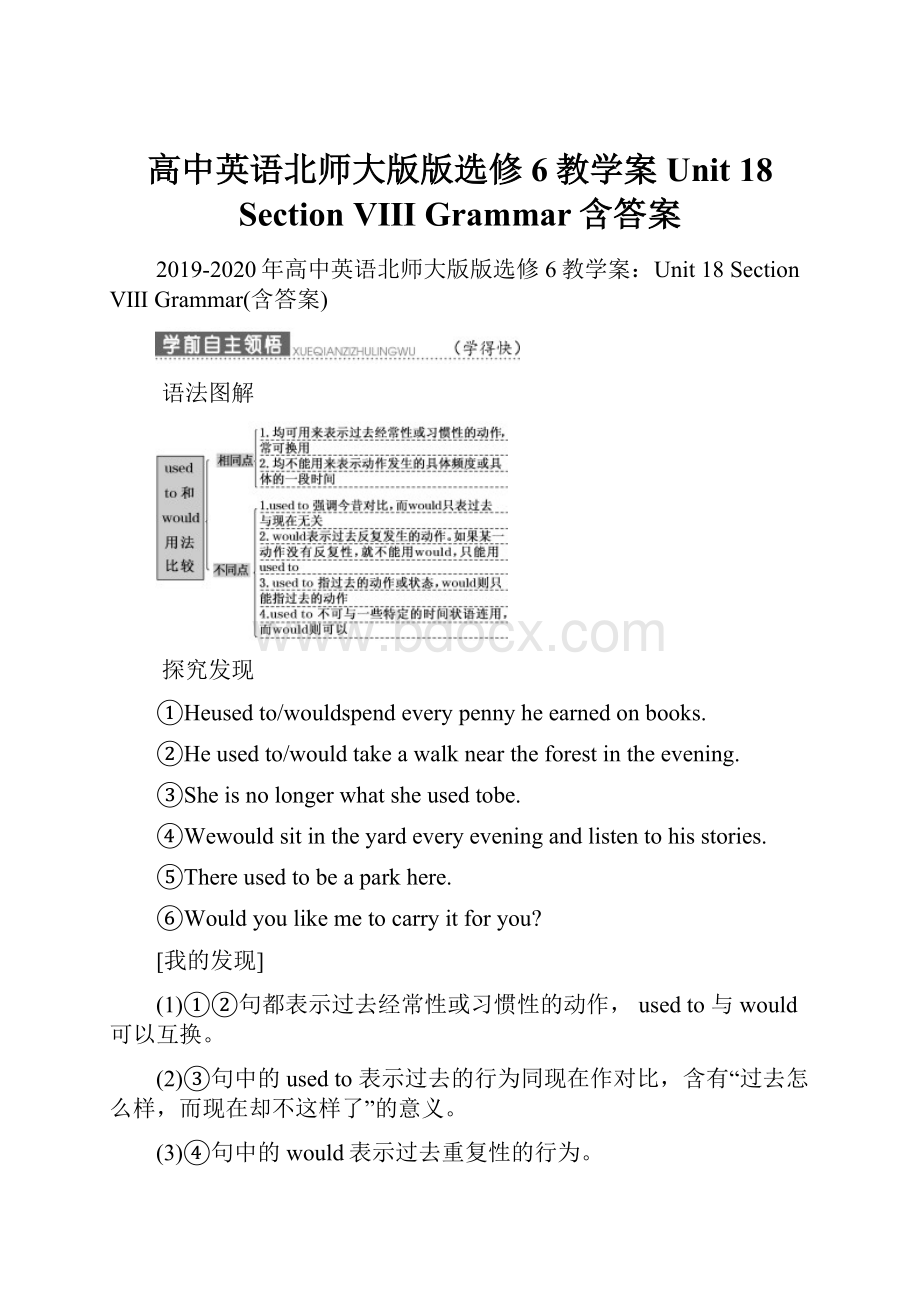 高中英语北师大版版选修6教学案Unit 18 Section Ⅷ Grammar含答案.docx
高中英语北师大版版选修6教学案Unit 18 Section Ⅷ Grammar含答案.docx
- 文档编号:25237706
- 上传时间:2023-06-06
- 格式:DOCX
- 页数:13
- 大小:91.27KB
高中英语北师大版版选修6教学案Unit 18 Section Ⅷ Grammar含答案.docx
《高中英语北师大版版选修6教学案Unit 18 Section Ⅷ Grammar含答案.docx》由会员分享,可在线阅读,更多相关《高中英语北师大版版选修6教学案Unit 18 Section Ⅷ Grammar含答案.docx(13页珍藏版)》请在冰豆网上搜索。

高中英语北师大版版选修6教学案Unit18SectionⅧGrammar含答案
2019-2020年高中英语北师大版版选修6教学案:
Unit18SectionⅧGrammar(含答案)
语法图解
探究发现
①Heusedto/wouldspendeverypennyheearnedonbooks.
②Heusedto/wouldtakeawalkneartheforestintheevening.
③Sheisnolongerwhatsheusedtobe.
④Wewouldsitintheyardeveryeveningandlistentohisstories.
⑤Thereusedtobeaparkhere.
⑥Wouldyoulikemetocarryitforyou?
[我的发现]
(1)①②句都表示过去经常性或习惯性的动作,usedto与would可以互换。
(2)③句中的usedto表示过去的行为同现在作对比,含有“过去怎么样,而现在却不这样了”的意义。
(3)④句中的would表示过去重复性的行为。
(4)⑤句中的usedto表示过去的状态。
(5)⑥句中的would表示委婉地提出看法、请求或建议等。
一、usedto的用法
1.usedto表示过去的习惯动作或状态现在已不存在,其后接动词原形。
Heusedtoplayfootballwhenhewasyoung.
他年轻的时候常常踢足球。
IusedtoliveinBeijing,butnowIliveinShanghai.
我过去住在北京,但是现在住在上海。
2.usedto在句中的几种形式:
(1)否定式
过去我不喜欢歌剧。
(2)疑问式
过去你喜欢歌剧吗?
(3)反意疑问式
如果是thereusedtobe...句型,附加疑问句用wasn’t/weren’tthere。
Youusedtolikeopera,didn’tyou?
你过去喜欢歌剧,是吗?
Thereusedtobeachurchhere,wasn’tthere?
过去这里有座教堂,是吗?
[即时演练1]
(1)句型转换
①Weusedtogoswimminginsummer.(变为否定句)
→Wedidn’tusetogoswimminginsummer.
②Mysisterusedtobeshywhenshewasatschool.(变为一般疑问句)
→Didyoursisterusetobeshywhenshewasatschool?
(2)完成句子
①Idon’tplaygolfnow,butIused_to(过去常常打).
②Wedidn’t_use_to/usedn’t_to(过去不常)goouttowalk.
③Theredidn’t_use_to_be/usedn’t_to_be(过去没有)somanyshops.
④Ihaven’t_got_used_to(没习惯)thenewsystemyet.
二、would的用法
1.would是will的过去式,表示过去的“意志、意愿”,可用于多种人称。
Theysaidthattheywouldhelpus.
他们说他们愿意帮助我们。
2.would指的是现在的时间时,表示说话人的意愿或向对方提出请求,语气比will委婉,也可表示委婉地提出看法、请求、建议等。
Iwouldliketohaveatry.
我想试一试。
Wouldyoulikemetocarryitforyou?
我帮你拿好吗?
I’mafraidthejourneywouldbetooexpensive.
我恐怕这次旅行的费用太高了。
3.表示过去反复发生的动作或过去的一种倾向。
Onsummereveningstheywouldsitoutinthegarden.
在夏天的晚上他们经常坐在外面的花园里。
4.用在虚拟语气中。
Ifyouhadcomeearlier,youwouldhaveseenhim.
如果你早来一点儿,你就能见到他。
[即时演练2] 完成句子
①OnSundayshe_would_come_and_work_with_usonthosedays.
在那些日子里,每当星期日他总会来和我们一起劳动。
②Marywould_come_to_mewhenshewasintrouble.
玛丽有困难时总是来找我。
③IfIweretodothejob,I_would_do_it_in_a_different_way.
要是我来做这项工作,我会用另一种方法。
三、usedto和would的用法比较
1.相同点
(1)would与usedto都可用来表示过去经常性或习惯性的动作,常常可以换用。
Whenwewereboysweusedto/wouldgoforanoutingeveryspring.
小时候,每到春天我们都要去郊游。
WhenIwasyoungIusedto/wouldgetupearly.
我年轻时经常早起。
(2)would与usedto都不能用来表示动作发生的具体频度或具体的一段时间。
我去过法国六次。
他在非洲住过二十年。
2.不同点
(1)usedto表示“过去常常”,暗含“现在不再……了”的意思,强调今昔对比。
would只表示过去情况,与现在无关,只表示说话人对过去事实的回顾和陈述。
不含有“过去如此,现在不再这样”的意味。
Hewouldgototheparkassoonashewasfree.
过去,他总是一有空就去公园。
(现在有可能还去)
(2)would表示反复发生的动作。
如果某一动作没有反复就不能用would,只能用usedto。
Hewassobusythathewouldworkintothenight.
他过去很忙,以至于总是工作到深夜。
(具有反复性)
Iusedtoliveinaflat.
我过去住在一套公寓房里。
(没有反复性)
(3)usedto还可与be动词连用,表示过去的状态,而would则不可以。
Sheusedtobeaquietgirl.
她以前是个文静的女孩。
不可以说:
Shewouldbeaquietgirl.
(4)usedto本身就指过去的习惯性动作或状态,所以通常不与often,frequently,sometimes等连用;而would则往往带有这些状语。
Ofteninholidays,hewouldgotosomeplacesofinterest.
过去,通常在假期期间,他会去参观一些名胜。
Hewouldsometimessitalone,deepinthought.
过去,有时候他独自坐着陷入沉思。
[即时演练3]
(1)选词填空:
would,usedto
①Whenworkinginthesameoffice,wewould/used_tohelpeachother.
②Heismuchricherthanwhatheused_tobe.
③HegotpromotedastheCEOofthefirm,andtherefore,heisn’twhatheused_tobe.
④Whenhewasthere,hewouldgotothatcoffeeshopatthecornerafterworkeveryday.
⑤Whenwewerechildrenwewould/used_togoskatingeverywinter.
⑥InChina,womenused_to/wouldwearjewelleryontheirheads.
(2)对比翻译
①他过去常吸很多烟。
(现在不吸了)
He_used_to_smoke_a_lot.
②他年轻时,总是吸很多烟。
(只陈述过去的这种习惯,与现在无关。
现在可能吸也可能不吸)
He_would_smoke_a_lot_when_he_was_young.
Ⅰ.选词填空:
would,usedto
1.Peopleused_tobelievethattheearthwasflat.
2.Thereused_tobeatalltreehere.
3.Idon’tswimasoftenasIused_to.
4.Hewouldsittherealone,thinking.
5.Iwould/used_togotoschoolbybikewhenIwasyoung.
6.Wouldyoumindleavingusaloneforafewminutes?
7.IactuallybelievethatwewouldbeinXi’annowifyouhadn’tbeencaughtdrunkdrivinglastmonth.
8.“Iwoulddoanythingforourcountry,”saidthesoldier.
Ⅱ.完成句子
1.Mydaughterused_to_like_chocolates,_butnowshelikesfruits.
我女儿过去喜欢巧克力,但现在喜欢水果。
2.Yet,hecannotbutrememberChinaasit_used_to_be.
然而,他不会不记得旧日的中国。
3.Whenshewassad,she_used_to/would_sit_in_front_of_that_mirrordoingnothing.
当她伤心的时候,她总是坐在那面镜子前,什么也不做。
4.Whenhewasyoung,he_would_sleep_late_on_Sundays,_justashedoesnow.
他年轻的时候,总在星期天睡懒觉,就像现在一样。
5.Idon’tsmokethesedays,but_I_used_to.
我现在不抽烟,但过去抽。
6.Whenweworkedinthesameoffice,we_would_often_have_coffee_together.
我们过去在同一间办公室工作的时候,经常一起喝咖啡。
单元语法项目
(二)——限定词
语法图解
探究发现
①IcalledonSherlockHolmesonthesecondmorning.
②Thereisastoryaboutthathatwhichwillhelpyousolveanothermysteriouscrime.
③Thereissomedustonitandseveralspots.
④Thetextfirstmentionsamanandagooseandlaterthemanandthegoose.
⑤Hecausedhisparentsagreatdealofpain.
⑥Therearealotoffaultsinyourpaper.
[我的发现]
(1)数词作限定词的为句①。
(2)冠词作限定词的有句②④。
(3)形容词性指示代词作限定词的有句②。
(4)形容词性物主代词作限定词的有句⑤⑥。
(5)形容词性不定代词作限定词的有句②③。
一、概念
限定词是在名词词组中对名词中心词起特指、类指以及表示确定数量和非确定数量等限定作用的词类。
Hisnewcomputerisveryexpensive.
他的新电脑很昂贵。
Hisgrandfatherlivesinthatsmallvillage.
他爷爷住在那个小村庄里。
二、种类
冠词
a,an,the
形容词性指示代词
this,that,these,those
形容词性物主代词
my,your,our,his,her,their,its
形容词性不定代词
both,every,much,some,any,afew
数词
one,two...;first,second...;one third,three fifths...
特指形容词
next,only,etc.
Thesunrisesintheeastandsetsinthewest.
太阳东升西落。
Mygrandfatherisaverykindman.
我祖父是一个非常友善的人。
Heboughtsomenewbooksforus.
他给我们买了一些新书。
Thatnewhousewasbuiltlastyear.
那栋新房子是去年建的。
Ifyoudon’tlikethisone,tryanother.
如果你不喜欢这一个,请再试另一个。
Thatistheonlyaccesstothecave.
那是入洞的唯一通道。
[名师点津] 冠词表类指有3种情况:
不定冠词a/an,定冠词the和零冠词都可泛指类。
Atigerisatypeofverylargefiercewildcatthathasyellowfurwithblackbandsacross.
老虎是一种毛皮为黄色、全身长满黑色条纹、形体很大的凶猛的野生猫科动物。
Thecargoesfasterthanthebike.
汽车比自行车跑得快。
Farmersarebusyharvestingandplantinginautumn.
农民们在秋天忙于收获和播种。
[即时演练1] 用适当的冠词填空
①(2015·浙江高考单选)Jane’sgrandmotherhadwantedtowriteachildren’sbookformanyyears,butonethingoranotheralwaysgotintheway.
②(2015·陕西高考单选)Themorelearnedamanis,themoremodestheusuallybecomes.
③(2015·四川高考单选)Brianisgiftedinwritingmusic;heisverylikelytobeaBeethoven.
④Aone year oldchildwasreportedtohavebeenleftaloneforovertwodays.
⑤—Howdoyoulikethemovie?
—Itisnotalittleinteresting.
三、用法
用法
例词
只能限定单数可数名词的限定词
another,each,neither,either,thewhole,every,a/an,one...
只能限定复数可数名词的限定词
many,several,these,those,acoupleof,anumberof...
只能限定不可数名词的限定词
much,(a)little,abitof,agreatdealof,anamountof...
既可限定不可数名词,又可限定单数可数名词和复数可数名词的限定词
all,any,half,my,your,our...no,therestof,thesame,some,such,what,this,that,which,whose,the...
既可限定不可数名词,又可限定复数可数名词的限定词
enough,more,most,plentyof,aquantityof,alotof,lotsof,less...
既可限定单数可数名词,又可限定复数可数名词的限定词
next,last,theother,first,second...
Thereisanotherwayoflookingatthequestion.
还有另一种办法来看待这个问题。
SheclaspedHelen’shandsinbothhers.
她用双手抓住海伦的手。
Shehadlittleaffectionforhim.
她对他没有什么感情。
Allthechildrenwereunderseven.
所有的孩子都不到七岁。
IhavealotofAmericanfriends.
我有很多美国朋友。
Wespentthelastdaysofourholiday.
我们度过了假期的最后几天。
[名师点津]
(1)another,theother,others,other用法不同:
another“另一,又一,再一”,后接单数可数名词(三者或三者以上的另一个);“还,又,再”,后接复数可数名词。
theother后接名词或代词,指两者中的“另一个”,常与one连用,意为“另一个”。
others没有范围,指别的人或物。
other“别的,其他的”,要放在量词和数词之后。
manyotherthings“许多别的东西”。
Wewalkedanotherthreehundredyards.
我们又走了三百码。
(2)多个形容词作定语的排列顺序
如果两个以上的形容词修饰一个名词时,常用顺序:
限定词(these,those...)+数量形容词+描绘性形容词+表大小、长短、高低等形体性形容词+新旧+颜色+国籍+材料+用途+被修饰的名词。
thosethreebeautifullargeoldredChinesewoodwritingdesks
那三张漂亮的巨大红色中国古代旧木制写字桌
[即时演练2] 选词填空
①—Finished?
—No,I’veanotherthreequestionstodo.
②Theoldcouplehadtwosons.OnesonwenttoliveinAustraliaandthe_otheronewaskilledinacarcrash.
③Canyouthinkofotherwaysofdoingthisexercise?
④Sayingisonethingwhiledoingisanother.
⑤She’sworriedbecauseshehasgotsomeinterviewsnextweekandtheyalwaysmakehernervous.
⑥AnybuswilltakeyoutoKing’sCrosssogetonthefirstthatcomesalong.
⑦There’snoreasontoberudeallthetime.
Ⅰ.选词填空
1.CouldIhavesomebeerplease?
2.Oneman’smeatisanotherman’spoison.
3.Ihavemuchpleasureindeclaringthenewfactoryopen.
4.Somecountriesarerich.Othercountriesarepoor.
5.Sheatea_small_quantity_ofricesothatshecouldslim.
6.AMrWangcametoseeyouthismorning.
7.Eachchildwillfindhisownpersonalroadtosuccess.
8.Ihavereadallthebooksyoulentme.
Ⅱ.完成句子
1.The_only_passengersurvivingthetrafficaccidentwasagirl.
这起交通事故的唯一幸存者是一个姑娘。
2.Ispentthe_whole_morninglisteningtoamusicaltoday.
今天整个早上我都在听一部音乐剧。
3.Don’tworryifyoucan’tcome_to_the_party.I’llsavesome_cake_for_you.
如果不能参加聚会,你不用担心。
我会为你留一些蛋糕。
4.Hehasmadealotoffilms,butfew_good_ones.
他已经制作了很多部电影,但没有几部佳作。
5.—Couldweseeeachotherat3o’clockthisafternoon?
—Sorry,let’smake_it_another_time.
——我们今天下午3点可以见面吗?
——对不起,我们另外约个时间吧。
6.Ihavebeendoingthe_same_workallthetimesinceIleftschool.
自从毕业到现在,我一直在做同样的工作。
- 配套讲稿:
如PPT文件的首页显示word图标,表示该PPT已包含配套word讲稿。双击word图标可打开word文档。
- 特殊限制:
部分文档作品中含有的国旗、国徽等图片,仅作为作品整体效果示例展示,禁止商用。设计者仅对作品中独创性部分享有著作权。
- 关 键 词:
- 高中英语北师大版版选修6教学案Unit 18 Section Grammar含答案 高中英语 北师大 选修 教学 Unit Grammar 答案
 冰豆网所有资源均是用户自行上传分享,仅供网友学习交流,未经上传用户书面授权,请勿作他用。
冰豆网所有资源均是用户自行上传分享,仅供网友学习交流,未经上传用户书面授权,请勿作他用。


 《爱和自由》读书心得15篇.docx
《爱和自由》读书心得15篇.docx
